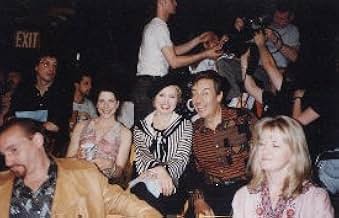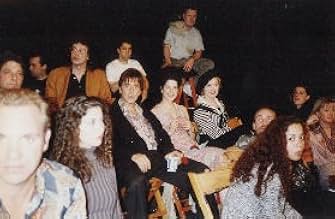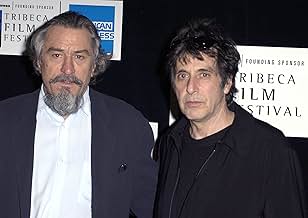IMDb-BEWERTUNG
7,0/10
4862
IHRE BEWERTUNG
Füge eine Handlung in deiner Sprache hinzuHarry and Jake, two unsuccessful writers, spend a cathartic evening arguing about money, aesthetics, their friendship, and Harry's new manuscript.Harry and Jake, two unsuccessful writers, spend a cathartic evening arguing about money, aesthetics, their friendship, and Harry's new manuscript.Harry and Jake, two unsuccessful writers, spend a cathartic evening arguing about money, aesthetics, their friendship, and Harry's new manuscript.
Hazelle Goodman
- Cafe Dante waitress
- (as Hazel Goodman)
Empfohlene Bewertungen
Harry Levine (Al Pacino) and Jake Manheim (Jerry Orbach), two unsuccessful writers, spend a cathartic evening arguing about money, aesthetics, their friendship, and Harry's new manuscript.
This film, based on a Broadway play (which had starred Pacino) is well-adapted by director Al Pacino (it helps that there was minimal stuff to direct). The origin as a play is fairly obvious, given how much is talk and how little is action (and I wonder if they had to add or modify scenes to create additional movement and scenery).
While not one of the greatest films ever, and not even one of Pacino's best, it has its moments and it is a great interaction between two people. If you like a lot of dialogue and bickering (think "Clerks" without all the dirty talk) and miss Jerry Orbach, this is the film for you.
This film, based on a Broadway play (which had starred Pacino) is well-adapted by director Al Pacino (it helps that there was minimal stuff to direct). The origin as a play is fairly obvious, given how much is talk and how little is action (and I wonder if they had to add or modify scenes to create additional movement and scenery).
While not one of the greatest films ever, and not even one of Pacino's best, it has its moments and it is a great interaction between two people. If you like a lot of dialogue and bickering (think "Clerks" without all the dirty talk) and miss Jerry Orbach, this is the film for you.
For his 2nd movie, Al gives us an unusual movie, maybe imperfect but original and totally personal.
We are far away of a big production and big issues as the movie is a nightly discussion between two friends that have real troubles to live with their art.
Honestly, I see no difference between this fiction character and the real Al that was unveiled in his first movie: Al is a simple guy that loves NYC and his passion is more for stage than acting.
Nowadays when stars are obsessed with their look, Al just doesn't care, even if his bent attitude and ugly clothes, he may look as a tramp. It's funny to see that getting older, he has gone from godfather, mayor, the devil to lefty, Shylock and this penniless beret writer! In a funny way, he's like an old Serpico who hadn't leave his basement accommodation!
However, inside, he's still the same great guy: supportive, helpful but sometimes a bit grumpy and always ready to scream! But, what the heck, we are humans so imperfect and it's better to be straight and noisy than devious and smiling!
Thus, even if the stage is minimal and narrow, we have access to all those nuances from Al and his buddy is great to share the ball. There are even funny moments and a good reflexion about artists' condition.
In a way, Al didn't look for big effects but true, simple moments. It may be a waste but finally, it's like you can share a evening with him, talking about life and nothing, and thus it's infinitely valuable.
We are far away of a big production and big issues as the movie is a nightly discussion between two friends that have real troubles to live with their art.
Honestly, I see no difference between this fiction character and the real Al that was unveiled in his first movie: Al is a simple guy that loves NYC and his passion is more for stage than acting.
Nowadays when stars are obsessed with their look, Al just doesn't care, even if his bent attitude and ugly clothes, he may look as a tramp. It's funny to see that getting older, he has gone from godfather, mayor, the devil to lefty, Shylock and this penniless beret writer! In a funny way, he's like an old Serpico who hadn't leave his basement accommodation!
However, inside, he's still the same great guy: supportive, helpful but sometimes a bit grumpy and always ready to scream! But, what the heck, we are humans so imperfect and it's better to be straight and noisy than devious and smiling!
Thus, even if the stage is minimal and narrow, we have access to all those nuances from Al and his buddy is great to share the ball. There are even funny moments and a good reflexion about artists' condition.
In a way, Al didn't look for big effects but true, simple moments. It may be a waste but finally, it's like you can share a evening with him, talking about life and nothing, and thus it's infinitely valuable.
Well I just loved the Chinese Coffee for its brilliant acting and direction. It reminded me of the theater of the Absurd in a strange haunting way! With Chinese Coffee Mr. Pacino surpasses his own status of being a stellar performer & a superstar combined and cements his position as one of the greatest artists of all times.
The tone of the movie is intimate and artistic at times a little dark. I loved the stream of Levine's consciousness which makes the audiences look into his past---his hopes & failures. Pacino is brilliant as a middle aged struggling writer who is haunted by his own past, his parents' and his own shortcomings and aspirations.
Kudos to Mr. Pacino for providing us with such a brilliant artistic piece! He truly is a gem of an artist. Love him! God bless!
The tone of the movie is intimate and artistic at times a little dark. I loved the stream of Levine's consciousness which makes the audiences look into his past---his hopes & failures. Pacino is brilliant as a middle aged struggling writer who is haunted by his own past, his parents' and his own shortcomings and aspirations.
Kudos to Mr. Pacino for providing us with such a brilliant artistic piece! He truly is a gem of an artist. Love him! God bless!
Eight-time Oscar-nominated, Tony-winning master actor Al Pacino draws from off-off- Broadway this semi-autobiographical character study and boasts a cast of actors who've proved themselves before and after, a Greenwich Village setting, and thus the world of floundering poets, bartenders, belly dancers, photographers, jealous doormen, haughty Shakespearean quotes, urbane coffee shops and French restaurants. And yet not all of these intermingle naturally within the story, but are forced by a tug-of-war between the play Ira Lewis had written and the film Al Pacino wanted to make.
The narrative is almost exclusively as a one-on-one conversation between the two main characters, yet it is littered with various ineffectual camera angles and at times redundant flashbacks that add nothing to the story, which apparently relates the rapport, romance and failure in the pathetic mid-life of a failed writer barely making ends meet as a doorman, that is, until he is fired. It does so as if such cerebral notions of life would pull the emotional triggers they do here between the writer, Harry Levine, played by Pacino, and his friend Jake Manheim, a photographer played by Jerry Orbach. The result is that, yes, some arresting moments and observations are produced, but they feel nonetheless forced. As director, Pacino brings to bear a periodically overwrought utilization of cuts in the dialogue scenes with Harry and Jake, and so perhaps it is not the words themselves, but the prevention of their taking priority that causes them to seem contrived.
Harry visits Jake impulsively because he is desperate for money and Jake owes him some from a long time ago. He doesn't have the money, so the two engage in an all-night conversation about the aesthetics and troubles of their separate trades, past and present loves, and the directions their lives are taking. The play and film are set in New York City circa 1985. Why? I don't know.
After years of withholding it, Pacino allowed it to be released as a part of a three-movie boxed set called Pacino: An Actor's Vision. Though I see why he might not have been happy with his work, the film stands as testimony that art-house and independent films need not be about overrefined individuals, for Harry and Jake are, from what I could tell, animatedly high-handed men who have merely outlived their functions in society. This is decidedly the case for Jake, but whether or not it is for Harry seems the question of the film.
The narrative is almost exclusively as a one-on-one conversation between the two main characters, yet it is littered with various ineffectual camera angles and at times redundant flashbacks that add nothing to the story, which apparently relates the rapport, romance and failure in the pathetic mid-life of a failed writer barely making ends meet as a doorman, that is, until he is fired. It does so as if such cerebral notions of life would pull the emotional triggers they do here between the writer, Harry Levine, played by Pacino, and his friend Jake Manheim, a photographer played by Jerry Orbach. The result is that, yes, some arresting moments and observations are produced, but they feel nonetheless forced. As director, Pacino brings to bear a periodically overwrought utilization of cuts in the dialogue scenes with Harry and Jake, and so perhaps it is not the words themselves, but the prevention of their taking priority that causes them to seem contrived.
Harry visits Jake impulsively because he is desperate for money and Jake owes him some from a long time ago. He doesn't have the money, so the two engage in an all-night conversation about the aesthetics and troubles of their separate trades, past and present loves, and the directions their lives are taking. The play and film are set in New York City circa 1985. Why? I don't know.
After years of withholding it, Pacino allowed it to be released as a part of a three-movie boxed set called Pacino: An Actor's Vision. Though I see why he might not have been happy with his work, the film stands as testimony that art-house and independent films need not be about overrefined individuals, for Harry and Jake are, from what I could tell, animatedly high-handed men who have merely outlived their functions in society. This is decidedly the case for Jake, but whether or not it is for Harry seems the question of the film.
I just watched this on DVD, and although it offered some interesting moments and insights, the dialog felt forced and the two main actors, both of whom have done great work in other projects, didn't seem to click. On the DVD, there's an epilogue in the "features" section in which Pacino, who also directed, wondered whether there were too many flashbacks. Actually, I thought the flashbacks were enlivening, enabling the story to be more involving than it might otherwise have been. Pacino also mentions that because of Orbach's "Law and Order" shooting schedule, they were forced to film 84 pages of dialog in 21 days, perhaps explaining, at least in part, why the film feels a little undercooked.
Wusstest du schon
- WissenswertesAl Pacino starred in the 1992 Broadway stage production of "Chinese Coffee".
- PatzerNear the end of the film Harry is poured a full glass of seltzer with a lime in it by Barney. Although he does not touch it, the glass is empty when he gets up to leave.
- Zitate
Jake Manheim: I'm exhausted from being exhausted.
- VerbindungenReferenced in Biography: Al Pacino: Inside Out (2001)
- SoundtracksPalm Court
Written by Aaron Briggs (as Briggs), Alan Briggs (as Briggs) and Paul Williams (as Williams)
Courtesy of Opus 1 Production Music and Amphonic Music Limited (ASCAP)
Top-Auswahl
Melde dich zum Bewerten an und greife auf die Watchlist für personalisierte Empfehlungen zu.
- How long is Chinese Coffee?Powered by Alexa
Details
- Laufzeit1 Stunde 39 Minuten
- Farbe
- Sound-Mix
- Seitenverhältnis
- 1.85 : 1
Zu dieser Seite beitragen
Bearbeitung vorschlagen oder fehlenden Inhalt hinzufügen





























